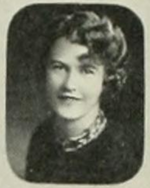Caroline Brady (philologist), Date of Birth, Place of Birth, Date of Death
TweetCaroline Brady (philologist)
American philologist
 Date of Birth: 03-Oct-1905
Date of Birth: 03-Oct-1905
 Place of Birth: Tianjin, China
Place of Birth: Tianjin, China
Date of Death: 01-Jan-0001
Profession: scientist, writer, philologist
Nationality: United States
Zodiac Sign: Libra 
About Caroline Brady (philologist)
- Caroline Agnes Brady (also known as Caroline Agnes Von Egmont Brady; October 3, 1905 – November 5, 1980) was an American philologist whose scholarship focused on Old English and Old Norse works.
- Among other places, she taught at the University of California, Berkeley, the University of Pennsylvania, Johns Hopkins University, and Harvard University.
- Her works included the 1943 book The Legends of Ermanaric, based on her doctoral dissertation, and three influential papers on the Anglo-Saxon poem Beowulf. Brady was born an American citizen in Tientsin, China, and traveled frequently as a child, spending time in Los Angeles, California, British Columbia, and Austin, Texas.
- She studied in the University of California system, receiving her bachelor's and master's degrees, and her Ph.D.
- in 1935.
- She next became an English instructor at that university's College of Agriculture, and worked as an assistant professor of languages and literature at Berkeley from 1941 to 1946.
- The following three years were spent at the University of Pennsylvania, until, at the end of 1949, Brady moved to teach at Central Oregon Community College; her resignation due to "ill health" was announced a few months later.
- After being named the 1952–53 Marion Talbot Fellow of the American Association of University Women and writing two articles, Brady's scholarship ceased for a quarter of a century.
- In 1979, and posthumously in 1983, her final two articles were published. Brady's monograph, The Legends of Ermanaric, argued that the Gothic king Ermanaric was subject to two competing traditions, and earned her a reputation as "a broad and discriminating investigator" with "a sovereign disregard of established opinion".
- Her papers on Beowulf, meanwhile, were identified by Katherine O'Brien O'Keeffe, a scholar of Anglo-Saxon literature, as "three fundamental studies" that were "philological in the traditional sense", shedding light on "the shades of meaning of the diction" used in the poem.
- Brady concluded that the Beowulf poet "is no artificer mechanically piling up synonyms and conventional metaphors, but an artist who knows how to use a variety of words and phrases".
Read more at Wikipedia
See Also
- Famous People's Birthdays on 03 October, China
- Famous People's Birthdays in October, China
- Famous People's Birthdays on 03 October, United States
- Famous People's Birthdays in October, United States
- Famous scientist's Birthdays on 03 October, China
- Famous scientist's Birthdays in October, China
- Famous writer's Birthdays on 03 October, China
- Famous writer's Birthdays in October, China
- Famous philologist's Birthdays on 03 October, China
- Famous philologist's Birthdays in October, China
- Famous scientist's Birthdays on 03 October, United States
- Famous scientist's Birthdays in October, United States
- Famous writer's Birthdays on 03 October, United States
- Famous writer's Birthdays in October, United States
- Famous philologist's Birthdays on 03 October, United States
- Famous philologist's Birthdays in October, United States

